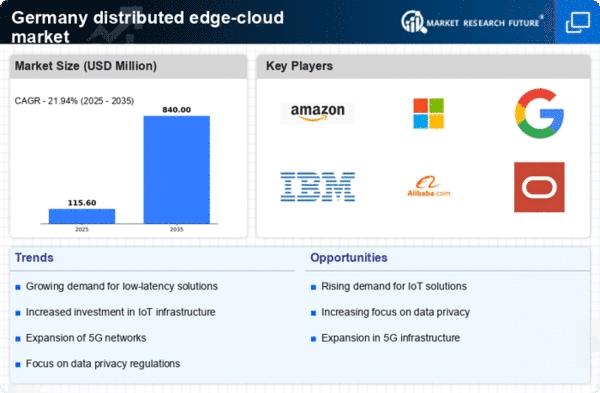Expansion of 5G Networks
The rollout of 5G networks across Germany is significantly influencing the distributed edge-cloud market. With the promise of higher speeds and greater connectivity, 5G technology enables more devices to connect simultaneously, thereby facilitating the deployment of edge computing solutions. Reports indicate that by 2026, 5G subscriptions in Germany could reach over 50 million, creating a robust environment for edge-cloud services. This expansion allows businesses to leverage real-time data analytics and IoT applications more effectively. As a result, the distributed edge-cloud market is poised for growth, driven by the enhanced capabilities that 5G brings to various sectors, including healthcare, transportation, and smart cities.
Rising Demand for Low Latency Services
The distributed edge-cloud market in Germany is experiencing a notable surge in demand for low-latency services. As industries increasingly rely on real-time data processing, the need for reduced latency becomes paramount. This trend is particularly evident in sectors such as automotive and manufacturing, where milliseconds can impact operational efficiency. According to recent data, approximately 70% of enterprises in Germany prioritize low latency in their cloud solutions. This growing emphasis on speed and responsiveness is driving investments in edge computing infrastructure, which is essential for delivering the required performance. Consequently, the distributed edge-cloud market is likely to expand as organizations seek to enhance their service offerings and improve customer experiences.
Increased Focus on Data Privacy Regulations
In Germany, stringent data privacy regulations, such as the General Data Protection Regulation (GDPR), are shaping the landscape of the distributed edge-cloud market. Organizations are compelled to adopt solutions that ensure compliance with these regulations while maintaining operational efficiency. This focus on data privacy is driving the demand for localized edge-cloud services, which can process and store data closer to the source. As businesses seek to mitigate risks associated with data breaches and non-compliance, the market for distributed edge-cloud solutions is likely to grow. It is estimated that compliance-related investments in cloud services could reach €3 billion by 2027, further propelling the distributed edge-cloud market.
Emergence of AI and Machine Learning Applications
The integration of artificial intelligence (AI) and machine learning (ML) into business operations is increasingly impacting the distributed edge-cloud market. These technologies require substantial computational power and low latency for optimal performance. As organizations adopt AI-driven solutions, the need for edge computing becomes more pronounced, allowing for real-time data processing and analysis. It is projected that the AI market in Germany will reach €10 billion by 2025, with a significant portion of this growth attributed to edge-cloud applications. Consequently, the distributed edge-cloud market is likely to benefit from this trend, as businesses seek to harness the power of AI and ML to enhance their operations.
Growing Interest in Sustainable Computing Solutions
Sustainability is becoming a critical consideration for businesses in Germany, influencing the distributed edge-cloud market. Organizations are increasingly seeking computing solutions that minimize energy consumption and reduce carbon footprints. The shift towards sustainable practices is prompting investments in energy-efficient edge computing technologies. Reports suggest that the market for green cloud services could grow by 25% annually, as companies prioritize eco-friendly solutions. This trend not only aligns with corporate social responsibility goals but also meets the demands of environmentally conscious consumers. As a result, the distributed edge-cloud market is likely to expand, driven by the increasing emphasis on sustainability in technology adoption.
















